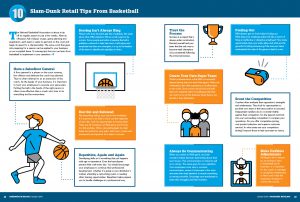
Click the picture to download a PDF of this story.
The National Basketball Association is about to tip off its regular season in just a few weeks. After an offseason full of player swaps, game planning and preparation, each team is ready to get back on the court and begin its quest for a championship. The same work that goes into preparing for a season can be applied to your business, so we compiled these 10 winning tips that you can learn from basketball to implement in your operation.
1. Have a Salesfloor General
A floor general is a player on the court running the offense and defense the coach has planned. They’re often referred to as an extension of the coach. As the leader of your business, it’s important to trust your employees to execute your game plan. Putting the ball in the hands of the right person is often more effective than a coach who tries to do everything and be everywhere.
2. Scoring Isn’t Always King
Players who drop 30 points get lots of publicity. But what about other NBA statistics? We’re not all meant to be scorers. Some people are better at passing the ball or grabbing a rebound to help their team. Each player and employee have their own strengths; it is up to the leaders of the team to identify and capitalize on them.
3. Box Out and Rebound
Not everything will go your way in the workplace. It’s important to be able to block out the negatives of your day. Look for opportunities to bounce back. There are 48 minutes in an NBA game and 8 hours in a full workday. Often, rebounding leads to a fast break and points for your team. Each hour, minute and possession are important for a team’s success.
4. Repetition, Again and Again
Developing skills isn’t something that just happens with age or experience. Even the best players practice their craft every day. You should encourage your employees to continue their professional development, whether it’s going to your distributor’s market, attending a networking event or seeking other training opportunities. Repetition helps prepare you to handle challenges in a professional way.
5. Trust the Process
Success is a project that’s always under construction. Remind yourself and your team that the only way to become retail champions is by consistently following the correct processes.
6. Create Your Own Super Team
There’s a phenomenon in the NBA of successful players leaving teams to enter free agency. Many are motivated to join other superstars on another team to win a title. Store owners should find and build their own superstar team of employees that they can count on to run the business when they’re not around or busy elsewhere.
7. Always Be Communicating
When you watch an NBA game, you hear constant chatter between teammates about their next moves. This communication is critical to pull out a victory. The same goes for your salesfloor. Your employees must stay in constant communication, aware of customers in the store and areas that need attention to ensure everything is running smoothly. Encourage your employees to share their struggles and their triumphs.
8. Fouling Out
NBA players get six fouls before fouling out. What does your employee policy look like in terms of firing an ineffective or disruptive employee? How many opportunities does your policy allow and what are the grounds for letting someone go? Be sure your team understands the rules of the game to lead to a win.
9. Scout the Competition
Coaches often evaluate their opposition’s strengths and weaknesses. They look for opportunities to put their own team in the best position to succeed. Independent retailers are in a constant battle against their competitors. Do the legwork and look into your surrounding competition to compare your operations. Do you offer competitive pricing, vast product selection and superior customer service? In what areas are your competitors lacking? Improve those to lead your team to victory.
10. Make Halftime Adjustments
Strategies don’t always go according to plan. In basketball and in business, it’s important for the coach or manager to recognize weaknesses or flaws and make the necessary changes to correct the course.
 Hardware Retailing The Industry's Source for Insights and Information
Hardware Retailing The Industry's Source for Insights and Information








